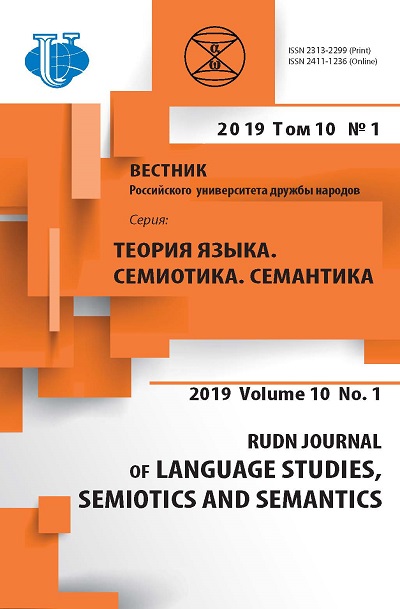FORMATION OF PROFESSIONAL (LINGVOCULTURAL) COMPETENCE OF ITALIAN STUDENTS0CULTUROLOGISTS
- Authors: Persiyanova S.G1, Rostova E.G2
-
Affiliations:
- Pushkin State Russian Language Institute
- Lomonosov Moscow State University
- Issue: Vol 10, No 1 (2019)
- Pages: 177-186
- Section: MISCELLANEA: SYSTEMIC APPROACH IN THEORETICAL AND APPLIED DESCRIPTIONS OF LANGUAGE
- URL: https://journals.rudn.ru/semiotics-semantics/article/view/20901
- DOI: https://doi.org/10.22363/2313-2299-2019-10-1-177-186
- ID: 20901
Cite item
Full Text
Abstract
The article deals with the problem of the formation of the professional (linguistic and cultural) competence of Italian students-culturologists, specializing in the study of Russian culture in its synchronic and diachronic examination. The authors offer a description and analysis of the program implemented by the Pushkin State Russian Language Institute together with the Milan State University. The program includes courses: “History of Russian Culture”, “Modern Russian Literature”, “Language and Culture”. The article focuses on the original course “Language and Culture”, which is part of the program, based on an analysis of the peculiarities of the connection between the Russian language and culture in different historical periods, which fundamentally distinguishes it from traditional language and culture courses. The article describes the features of the structure and content of the course “Language and Culture” for students-culturologists, its goals, tasks and methodological apparatus. The course includes five thematic sections: “The Language and Culture of Ancient Russia”, “The Russian Language and Culture of the 18th Century”, “The Russian Language and Culture of the 19th Century”, “The Russian Language and Culture of the 20th Century”. The main goal of the course is to deepen students’ knowledge of the relationship between the Russian language and culture (in the interaction of diachronic and synchronous components), the development of their communicative competence, mainly in the socio-cultural sphere of communication associated with the future professional activities of the culturologist. An important component of the training in this course is the Multimedia language and culture Dictionary “Russia”, which is publicly available on the Pushkin State Russian Language Institute portal. The dictionary materials (articles, media library, interactive tasks) form the main content of the course.
About the authors
Svetlana G Persiyanova
Pushkin State Russian Language Institute
Author for correspondence.
Email: SGPersiyanova@pushkin.institute
PhD, Dean of the faculty of teaching Russian as a foreign language
6 Ac.Volgin Str., Moscow, 117485, RussiaEvgeniya G Rostova
Lomonosov Moscow State University
Email: Rostova_evgenija@mail.ru
Associate Professor of the Department of comparative language studies, faculty of foreign languages and regional studies
GSP-1, Leninskie Gory, Moscow, 119991, RussiaReferences
- Bonciani, D., Romagnoli, R. & Smykunova, N.V. (2015). It’s a small world: the training manual on Russian culture and Russian studies for universities and linguistic lyceums, Russian language and literature in the space of the world culture: Materials of XII MAPRYAL’s International Congress (Granada, Spain, September, 13—20): in 15 volumes. St. Petersburg.
- Ramusino, P.C. & Persiyanova, S.G. (2017). On the study of the Russian language in Italy. The journal Russian language abroad. Special issue “Russian Studies in Italy”, 4—7. (In Russ.).
- Vereshchagin, E.M. & Kostomarov, V.G. (1990). Language and culture. Moscow: Russian Language publ. (In Russ.).
- Prokhorov, Yu.E. (2015). Signs of culture in the works of Y. Polyakov. Testing by realism. Materials of the theoretical and theoretical conference “Creativity of Yuri Polyakov: Tradition and Innovation” (to the 60th anniversary of the writer). Moscow. (In Russ.).
- Poor Lisa is a musical. Fragments from the director's notebook. URL: http://www.teatrunikitskihvorot.ru/spektakli/bednaya_liza/ (accessed: 06.08.18).
- Scientific concept of the project “1917. The revolution in language”. http://www.pushkin.institute/ projects/1917_revolyuciya_v_yazyke (accessed: 06.08.2018).
- Multimedia language and culture dictionary “Russia”. URL: https://ls.pushkininstitute.ru (accessed: 06.08.18).
Supplementary files












